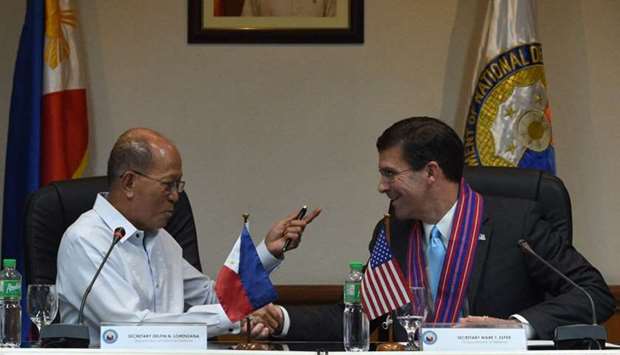US Defence Secretary Mark Esper on Tuesday vowed more
support for the Philippines in efforts to modernize the country's
military and improve maritime security as tensions build over the
disputed South China Sea.
Esper, who was in Manila for a one-day visit, said he and Philippine
Defence Secretary Delfin Lorenzana discussed various ways to
strengthen cooperation and further boost the two countries'
decades-old alliance.
"The United States will continue to support and to help modernize the
Philippines armed forces and to improve maritime security and domain
awareness," he told a press conference after their meeting.
"We look forward to train in future joint air and maritime patrols to
improve our interoperability and to demonstrate our commitment to
upholding the long-standing international rules and norms," he added.
Esper said the United States would continue to conduct
freedom-of-navigation operations in the South China Sea, despite
warnings by China against such activities, stressing that such acts
send a clear message that all countries should abide by international
laws.
"I think it is incumbent upon all of us to take a very public posture
and to assert our sovereign rights and to emphasize the importance of
law," he said.
Noting that the US has conducted more freedom-of-navigation
operations in the past year than in the previous 20 years, Esper
said: "The clear signal that we're trying to send is not that we
oppose China per se, but that we all stand for international rules
and international laws and that we think China should abide by them
as well."
"Acting collectively is the best way to send that message and to get
China on the right path," he added.
China claims almost the entire South China Sea as its territory and
has built artificial islands with military-capable facilities over
reefs and outcrops in the area, which are also claimed in part by
Vietnam, Malaysia, Brunei and Taiwan.
In July 2016, the Permanent Court of Arbitration ruled that Beijing
had no legal or historical basis for its "Nine-Dash Line," which
demarcates its claims to the South China Sea, a key shipping lane
believed to be rich in marine and mineral resources.
China has rejected the arbitration ruling, which was the result of a
case filed by the Philippines.
Esper and Lorenzana also discussed counter-terrorism cooperation as a
key pillar of the two countries' defence alliance.
"We stand shoulder-to-shoulder with the armed forces of the
Philippines in fighting terrorism," Esper said.
"The United States
remains committed in supporting the Philippines' continued efforts to
deny terrorist groups a safe haven in the region."
According to the Philippine defence department, troops are monitoring
suspected Islamic State-allied operatives who are believed to be
hiding in the southern region of Mindanao and working with local
terrorist groups.
International / ASEAN/Philippines
US vows more support for Philippines amid tensions in South China Sea

US Secretary of Defense Mark Esper (R) shakes hands with his Philippines counterpart Delfin Lorenzana (L) after their joint press conference at the Department of Defense in Manila


